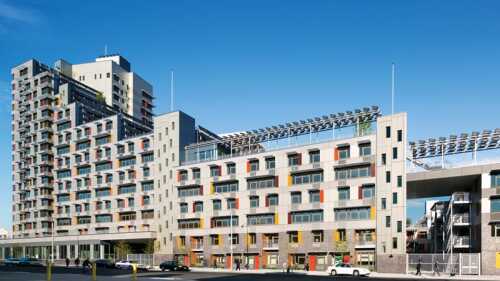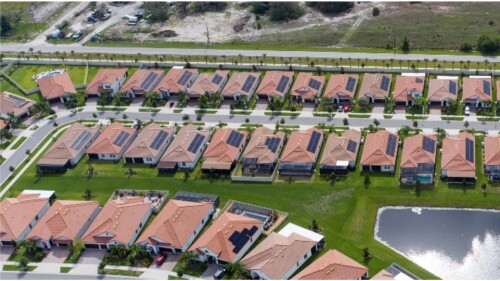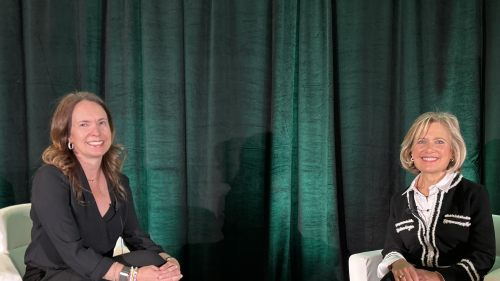ULI is enhancing its commitment to environmentally conscious development with the transfer of the activities and assets of the Greenprint Foundation into the newly formed ULI Greenprint Center for Building Performance. With this action, announced in January, ULI is continuing the operation of a unique industry-to-industry initiative through which leading real estate professionals exchange information and measure individual building and portfolio performance on the basis of energy use and carbon emissions.
The ULI Greenprint Center will be incorporated into ULI’s broader Climate, Land Use, and Energy (CLUE) initiative. The center will carry on the Greenprint Foundation’s mission, which is to lead the global real estate community in the use of greenhouse gas–reduction strategies that support the Intergovernmental Panel on Climate Change (IPCC) goals for global greenhouse gas stabilization by 2030. The ULI Greenprint Center will continue to advance the Greenprint Foundation’s goal of a 50 percent reduction in building emissions by that year. The energy used in buildings represents one-third of all global energy consumption.
The Greenprint Foundation, currently based in New York City, was founded in 2008 by longtime ULI member Ronald P. Weidner as a worldwide alliance of real estate owners, investors, financial institutions, and other industry stakeholders committed to reducing greenhouse gas emissions across the global property industry. Organizations that have signed up as Greenprint Foundation members so far are Aetos Capital, AvalonBay, Beacon Capital Partners, Blackstone Group, DEXUS Property Group, Douglas Emmett, Equity Office Properties, GE Capital Real Estate, GLL Real Estate Partners, Hines, Jones Lang LaSalle, LaSalle Investment Management, Paramount Group, PATRIZIA Immobilien, Prologis, Prudential Real Estate Investors, RREEF (a member of the Deutsche Bank Group), Sonae Sierra, and TIAA-CREF.
“With the support and resources of ULI, the ULI Greenprint Center will lead the global property markets in reducing greenhouse gas emissions in a meaningful and measurable way,” says Weidner. “More importantly, it can help change the behavior of the population at large.”
The flagship product of the Greenprint Foundation is its Greenprint Performance Report, which includes the Greenprint Carbon Index® (GCX), a tool used by foundation members to gauge relative progress in reducing greenhouse gas emissions over time. The first volume of the report was introduced in 2009 as a baseline measurement product. The second volume, issued in 2010, had results for 1,623 properties in the Americas, Europe, and Asia, and covered 334 million square feet (31 million sq m) of commercial space. It showed a 0.6 percent reduction in greenhouse gas emissions from the previous year on the comparable portfolio of submitted properties.
The international scope and size of the report, including the GCX, make it one of the real estate industry’s largest, most verifiable, transparent, and comprehensive energy benchmarking tools. It is unique in that it provides an open standard for measuring, benchmarking, and tracking energy use and resulting emissions on a building or portfolio basis. Carbon-equivalent emissions are measured in kilograms per square meter of space per year; the analysis is conducted for each building or group of buildings, and then reported in the aggregate for each property asset type—office, industrial, retail, multifamily, and hotels.
“The voluntary information exchange between Greenprint Foundation members that informs the report reflects ULI’s time-tested tradition of sharing knowledge for the benefit of the industry,” says ULI CEO Patrick L. Phillips. “We look forward to building on the collaborative spirit and effort that has formed the basis for the Greenprint Foundation and its carbon index. Through the ULI Greenprint Center for Building Performance we are aiming to fill a void of information on the value of investments in energy conservation and greenhouse gas reductions. We are extremely excited about the ability of this new center to demonstrate that environmentally sound building practices make economic sense.”
| The Public Library in Cambridge, |
The ULI Greenprint Center will assume the foundation’s existing research program and ongoing engagement with owners of commercial real estate toward value-enhancing carbon reduction strategies. ULI trustee Charles B. Leitner III, formerly the president and CEO of the Greenprint Foundation, will be chairman of the ULI Greenprint Center and cochairman of the advisory board for ULI’s CLUE initiative.
“The creation of the center will enable both organizations to jointly leverage their resources to keep the Greenprint Foundation’s momentum going,” Leitner said. “I see the ULI Greenprint Center’s work as becoming the global real estate industry’s diary of its efforts to dramatically lower the impact of buildings on the environment. We will continue to promote increased awareness of innovative technologies and best operating practices to reduce energy consumption and carbon emissions. Through this center, ULI can help position the land use and real estate industry as part of the solution to climate change.”
The ULI Greenprint Center will be guided by an advisory board chaired by Leitner and will include key leaders from Greenprint’s founding member companies. Among them are Weidner; Kenneth W. Hubbard, ULI trustee, first Greenprint president, and executive vice president of Hines U.S. in New York City; Fred A. Seigel, president and chief operating officer, Beacon Capital Partners LLC, Boston; Colin Dyer, president and CEO, Jones Lang LaSalle, Chicago; Gerd Kremer, managing director, GLL Real Estate Partners, Munich; and Ron Herbst, global head of energy management and sustainability, Deutsche Bank AG, London. Phillips and ULI senior vice president for initiatives Uwe Brandes will serve on the advisory board.






